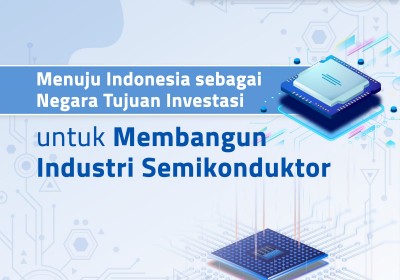Investment Stimulation Needed for Semiconductor Industry to Meet Chip Demand
September 17, 2021
JAKARTA – As outlined on the Making Indonesia 4.0 roadmap, the electronics industry is one of the government's priorities to develop.
To increase this industry's competitiveness, the government has laid out strategic plans to help stimulate the industry's capability of producing high-value and high-quality components. This plan was laid out by Industry Minister Agus Gumiwang Kartasasmita during an international webinar on Indonesia's strategic industrial growth strategies related to the issue of global chip shortages, on Tuesday (8/31).
"The government is determined to create a conducive business climate, including through encouraging Indonesia as an investment destination country to build the semiconductor industry," Minister Agus explained during the event.
The ongoing trade war between the United States and China, as well as the current Covid-19 pandemic, has greatly affected the global chip supply, making it harder to fulfill the global demand from various industries including automotive, electronics and telecommunications.
Minister Agus elaborated that the semiconductor industry development strategy needs to be carried out using various methods. This is because the development of the sector requires time to do so, along with a large amount of investment, not to mention the need for a workforce with high expertise and a manufacturing process that adheres to struct quality control measures.
"This provides new opportunities for Indonesian industry and startup investors to have chip manufacturing contracts, which are growing in various countries, especially the United States, Japan, China, Taiwan, South Korea and a number of countries in Europe," said the Minister.
He added that the 2020 Job Creation law (UU Cipta Kerja) was able to help ease business opportunity strategies, especially the ability of the domestic semiconductor manufacturing industry to produce chips locally.
"Strengthening the chip manufacturing industry must be done by through efforts to secure the supply of chips in the country, in addition to preparing the growth of the domestic chip industry itself," the Minister said.
Globally, chips continue to be of increased importance, from microcontroller chips to artificial intelligence chips whose functions are increasingly complex and in line with the development of Industry 4.0. The role of the chip industry is becoming increasingly strategic in national and global economic growth. In the current Industry 4.0 era, the need for semiconductor chips is consistently growing and are being utilized massively in various products. Therefore, it is necessary to encourage the gradual production of semiconductor chips domestically, which is in line with the government's import substitution programs' targets.
"And to achieve those targets, we would need the support of the government, who can help by implementing both fiscal and non-fiscal regulations and policies to support this aim," remarked the Minister. Providing incentives for prospective investors is one of the efforts to encourage more investment in Indonesia's semiconductor industry.
Minister Agus added that, as one of the G20 countries with a large population, establishing the presence of the Indonesian semiconductor industry is a national strategic matter due to the fact that the industry has the potential to pull in foreign exchange and also create more jobs.
"In launching the 2021 Digital Connectivity Program last February, President Joko Widodo emphasized the importance of sovereignty and independence in advancing digital transformation, by encouraging the use of domestic digital products and mastering the latest digital technologies," he said. In order to achieve this, Indonesia needs to ensure the availability and independence of the supply chain of digital devices and semiconductor chip components in the future.
The government also plans to participate in the global semiconductor industry value chain through collaboration with various multinational companies and startup companies around the world.
"Indonesia will encourage the growth of the downstream electronics industry and simultaneously seek to invite investment in the world's semiconductor industry, which includes the Fabless, Foundry, IDM and OSAT industries to Indonesia," said Minister Agus.
In particular, he added, Indonesia wanted to learn from Taiwan's successes in building the semiconductor industry, which is currently contributing greatly to the country's economy. "Taiwan's Industrial Technology Research Institute (ITRI) plays a significant role for the country' semiconductor industry, we want to use it as a lesson to develop our Engineering Center, which is run under the Industry Ministry," he said.
The minister hopes that the partnership between the Ministry's engineering center and the ITRI would open intensive communication between semiconductor and electronics firms in Taiwan with those in Indonesia.
Meanwhile, the Industry Ministry's director general for the steel, machinery, transportation and electronics industries (ILMATE), Taufiek Bawazier, said that producing semiconductor products will play a huge part in Indonesia someday producing key components for IoT, AI and many other high-technology products in the future.
"The development of the domestic semiconductor industry is needed to secure the supply chain needed, especially chip components that are required to grow the industry further," he said.
Indonesia’s Research Institutions Supporting the Development of the Electric Vehicle Industry
Indonesian Muslim Fashion and Cosmetics IKMs Shine at Dubai World Expo 2020
Govt Steps Up UMKM Transformation Efforts in the Midst of Pandemic Slowdown
Govt Encourages Promotion of IKM Products in Digital Era
Government Begins Developing Maritime Training Center in Makassar
Tweets by IDDevForum
